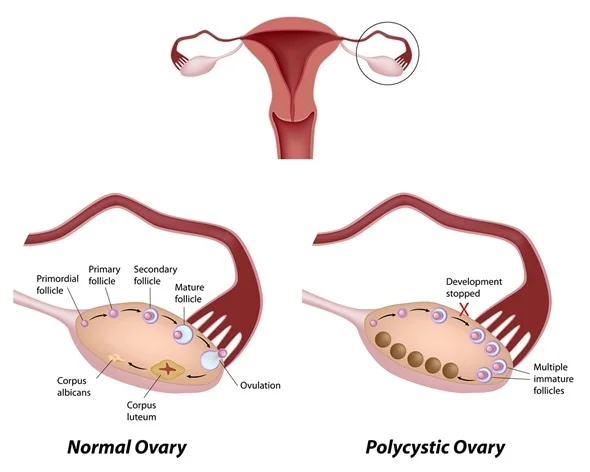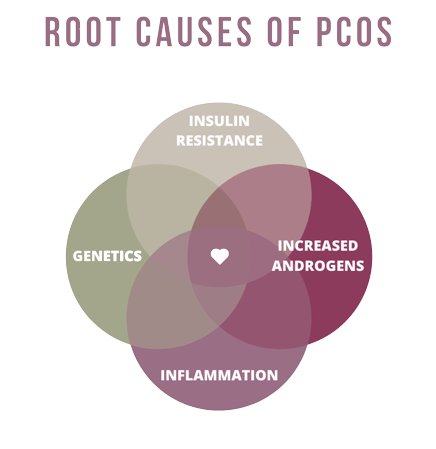What is polycystic ovarian syndrome?
Polycystic ovary syndrome (PCOS) is a hormonal imbalance that occurs when your ovaries (the organ that produces and releases eggs) create excess hormones. If you have PCOS, your ovaries produce unusually high levels of hormones called androgens. This causes your reproductive hormones to become imbalanced. As a result, people with PCOS often have irregular menstrual cycles, missed periods and unpredictable ovulation. Small follicle cysts (fluid-filled sacs with immature eggs) may be visible on your ovaries on ultrasound due to lack of ovulation (anovulation). However, despite the name “polycystic,” you don’t need to have cysts on your ovaries to have PCOS. The ovarian cysts aren’t dangerous or painful.

What are the signs of polycystic ovary syndrome (PCOS)?
The most common signs and symptoms of PCOS include:
Irregular periods
Abnormal menstruation involves missing periods or not having a period at all. It may also involve heavy bleeding during periods.
Abnormal hair growth
You may grow excess facial hair or experience heavy hair growth on your arms, chest and abdomen (hirsutism). This affects up to 70% of people with PCOS.
Acne
PCOS can cause acne, especially on your back, chest and face. This acne may continue past your teenage years and may be difficult to treat.
Obesity
Between 40% and 80% of people with PCOS have obesity and have trouble maintaining a weight that’s healthy for them.
Darkening of the skin
You may get patches of dark skin, especially in the folds of your neck, armpits, groin (between the legs) and under your breasts. This is known as acanthosis nigricans.
Cysts
Many people with PCOS have ovaries that appear larger or with many follicles (egg sac cysts) on ultrasound.
Skin tags
Skin tags are little flaps of extra skin. They’re often found in your armpits or on your neck.
Thinning hair
People with PCOS may lose patches of hair on their head or start to bald.
Infertility
PCOS is the most common cause of infertility in people AFAB. Not ovulating regularly or frequently can result in not being able to conceive.
What is the main cause of PCOS?
- Higher levels of male hormones called androgens: High androgen levels prevent your ovaries from releasing eggs, which causes irregular menstrual cycles. Irregular ovulation can also cause small, fluid-filled sacs to develop on your ovaries. High androgen also causes acne and excess hair growth in women and people AFAB.
- Insulin resistance: An increase in insulin levels causes your ovaries to make and release male hormones (androgens). Increased male hormones suppress ovulation and contribute to other symptoms of PCOS. Insulin helps your body process glucose (sugar) and use it for energy. Insulin resistance means your body doesn’t process insulin correctly, leading to high glucose levels in your blood.
- Low–grade inflammation: People with PCOS tend to have chronic low-grade inflammation. Your healthcare provider can perform blood tests that measure levels of C-reactive protein (CRP) and white blood cells, which can indicate the level of inflammation in your body.

Get in touch with our team
Specialised care from the best team of doctors along with a widely trusted high risk pregnancy specialist in Pune. Sail smoothly through high risk pregnancies.